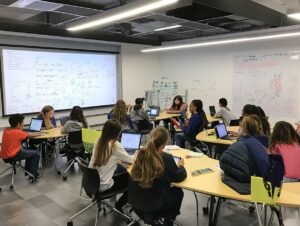Navigating the landscape of career options after graduation can be a daunting experience. With numerous paths available, it is essential to understand one’s interests and skills in order to make informed decisions.
This guide addresses traditional career paths, including positions related to one’s field of study and valuable internship opportunities, while also examining alternative routes such as freelancing and entrepreneurship.
It emphasizes the significance of further education and professional development, in addition to outlining effective networking strategies to assist individuals in securing appropriate opportunities.
Whether one is seeking stability in a conventional job or exploring unconventional avenues, this guide provides valuable insights to aid in charting a successful course.
Exploring Career Options

Exploring career options is a critical step for individuals seeking to navigate the complexities of the job market and secure fulfilling employment opportunities following graduation.
As students transition from academic life to their professional pursuits, it is imperative to assess personal interests, skills, and current industry trends. This process typically begins with an understanding of the various pathways available, including higher education, vocational training, internships, and professional certifications, all of which can significantly enhance employability and career progression.
Additionally, engaging in networking and skills development initiatives is essential for preparing candidates to thrive in the competitive landscape they will encounter during their job search.
Understanding Your Interests and Skills
Understanding one’s interests and skills is essential for effectively navigating the intricate landscape of career options available today. This self-assessment process enables individuals to identify their strengths, weaknesses, and passions, which are crucial in determining suitable career paths that align with their values and professional aspirations.
By actively engaging in self-reflection and utilizing tools such as personality assessments or skills inventories, individuals can acquire invaluable insights into their unique profiles. Seeking career counseling provides tailored guidance, facilitating the recognition of transferable skills applicable across various industries.
Additionally, developing a personal brand is instrumental in effectively communicating these strengths to potential employers, thereby highlighting an individual’s value. Embracing online courses focused on skill development further enhances qualifications, ensuring that individuals meet evolving job expectations while remaining competitive in the job market.
Traditional Career Paths
Traditional career paths, commonly linked to established sectors and industries, present numerous options for graduates aspiring for stability and growth in their professional endeavors.
These paths generally encompass positions within corporate environments, government agencies, and nonprofit organizations, offering a defined trajectory for career advancement through structured graduate programs and entry-level roles.
As graduates consider these opportunities, it is crucial for them to comprehend salary expectations and workplace culture, as this knowledge is vital for making informed decisions regarding their career choices.
Jobs in Your Field of Study
Securing a position in one’s field of study can be a highly rewarding endeavor, particularly as individuals apply the knowledge and skills acquired during their academic training to real-world situations. Many graduates achieve success in entry-level roles that closely align with their educational background, enabling them to navigate industry trends and accumulate valuable work experience.
These positions frequently serve as a stepping stone toward more advanced roles, allowing individuals to refine their skills and establish a professional network. By strategically tailoring job applications to highlight relevant coursework and internships, candidates can enhance their visibility to prospective employers.
In the dynamic job market, understanding the skills currently in demand can significantly improve one’s employment prospects. Remaining informed about emerging technologies and industry developments is essential, as it enables applicants to present themselves as knowledgeable and adaptable—qualities that are highly regarded by employers.
Therefore, aligning educational pursuits with job applications not only facilitates initial employment but also establishes a solid foundation for long-term career success.
Internships and Entry-Level Positions
Internships and entry-level positions are essential stepping stones for recent graduates seeking to establish their careers in their chosen fields. These opportunities provide invaluable hands-on work experience, allowing individuals to apply their academic knowledge in practical settings while simultaneously enhancing their resumes and expanding their professional networks.
Participating in such roles not only fosters confidence but also equips individuals with critical skills that are often not addressed within the classroom setting. Skills such as effective communication, teamwork, and problem-solving are refined through real-world challenges and interactions with experienced professionals.
Job shadowing further enriches this experience by enabling aspiring candidates to observe industry practices and comprehend workplace dynamics firsthand. When combined with mentorship, which offers invaluable guidance and encouragement, these experiences create a robust foundation for future endeavors.
Moreover, networking during these engagements facilitates the development of relationships that may lead to potential job opportunities, thereby significantly increasing the likelihood of securing employment upon graduation.
Alternative Career Paths

Alternative career paths, including freelancing and entrepreneurship, have experienced notable growth in popularity in recent years as individuals pursue flexible work arrangements and seek opportunities to shape their own professional trajectories.
These avenues allow individuals to effectively leverage their skills and passions in innovative manners, frequently resulting in a rewarding career transition that aligns with their personal values and lifestyle preferences.
Exploring Non-Traditional Careers
Exploring non-traditional careers can unveil a multitude of opportunities for individuals willing to step beyond the confines of conventional job roles. These careers frequently arise in sectors such as nonprofit organizations, creative industries, and technical fields, providing unique experiences that contribute to both personal and professional development.
Upon examining these diverse pathways, it becomes evident that positions such as social entrepreneurs, digital content creators, and data analysts are gaining increasing significance in today’s workforce.
The appeal of these options lies in their inherent flexibility and diversity, enabling individuals to customize their careers to align with their passions and skill sets.
Investing in skill development is crucial, as ongoing education in areas such as digital marketing or coding can substantially enhance career prospects in these rapidly advancing fields.
Adopting a mindset of continuous learning cultivates resilience and adaptability—qualities that are essential for success in any non-traditional career trajectory.
Freelancing and Entrepreneurship
Freelancing and entrepreneurship offer individuals a distinctive pathway to gain control over their careers and engage in projects that align with their passions. By effectively utilizing personal branding and digital portfolios, aspiring entrepreneurs can attract clients and establish successful ventures within today’s rapidly evolving job market.
This pursuit of independence not only enhances job satisfaction but also facilitates the development of a fulfilling work-life balance. Individuals involved in freelancing frequently engage in continuous learning, undertaking online courses to refine their skill sets and adapt to industry changes.
In this context, the integration of personal branding is essential, as a well-defined brand identity conveys expertise and reliability. Ultimately, the combination of targeted skill enhancement and a robust personal brand significantly contributes to achieving sustainable success, as both elements serve to elevate professional visibility and expand opportunities in a competitive landscape.
Further Education and Professional Development
Further education and professional development are essential for enhancing an individual’s career prospects and job satisfaction.
As the job market continues to evolve, engaging in higher education, vocational training, and obtaining relevant professional certifications enables individuals to remain competitive and effectively address skill gaps within their chosen fields.
Graduate School and Continuing Education
Graduate school and continuing education provide individuals with the opportunity to deepen their knowledge and expertise in a specific field, significantly enhancing their potential for career advancement. Through structured graduate programs and ongoing learning initiatives, professionals can access valuable resources and expand their professional networks.
This continuous learning journey fosters essential skills and cultivates a sense of confidence that translates into improved job performance. As individuals refine their capabilities, they often experience greater engagement and satisfaction in their roles, contributing positively to their workplace environment.
Pursuing graduate studies enables professionals to participate in career assessments, which assist them in clarifying their goals and aligning their efforts with current market demands. Ultimately, the decision to further one’s education can lead to increased opportunities for mentorship and collaboration, creating a supportive ecosystem that enhances not only individual success but also overall job satisfaction.
Certifications and Training Programs

Professional certifications and training programs play a crucial role in addressing skill gaps and demonstrating expertise in specific areas of a profession. As industries continue to evolve, obtaining relevant certifications significantly enhances an individual’s credibility and employability, thereby increasing their attractiveness to potential employers.
These credentials not only validate a person’s skill set but also reflect their commitment to remaining current in a rapidly changing workforce. Participation in industry-specific training programs not only enhances technical abilities but also fosters a deeper understanding of emerging trends, which is essential for career advancement.
Professionals who invest in these certifications often experience greater job satisfaction and loyalty, as they feel more equipped to address complex challenges and contribute meaningfully to their organizations. Ultimately, such proactive efforts in personal and professional development can lead to increased opportunities for promotions and long-term job retention.
Networking and Job Search Strategies
Networking and the implementation of effective job search strategies are essential elements of a successful career transition. These practices enable individuals to identify hidden employment opportunities and cultivate meaningful professional relationships.
Actively engaging with alumni connections, participating in job fairs, and utilizing employment agencies can substantially increase one’s likelihood of obtaining desirable positions in a competitive job market.
Building Connections and Finding Opportunities
Establishing connections and identifying opportunities within one’s chosen field necessitates proactive engagement with professional networks and communities. Leveraging alumni connections and actively participating in industry-related events can yield valuable insights and lead to potential job listings that align with specific career objectives.
In today’s competitive job market, cultivating meaningful relationships and building a robust network can significantly influence career trajectories. Exploring various networking platforms, such as LinkedIn, offers considerable advantages in connecting with industry experts and peers.
Developing personal skills, including effective communication and active listening, can enhance interactions and foster more productive outcomes. Attending workshops and conferences not only facilitates skill development but also provides unique opportunities to learn about unadvertised positions.
By strategically engaging with professionals in their field, individuals can uncover hidden job opportunities, secure mentorship, and remain informed about industry trends that directly impact their career advancement.
Frequently Asked Questions
What are some common career options after graduation?
Some common career options after graduation include working in a specific industry, pursuing further education, starting a business, or working in a non-traditional field such as freelancing or remote work.
How do I decide which career option is best for me after graduation?

It is important to consider your interests, skills, values, and goals when deciding on a career after graduation. You can also research different industries, job roles, and speak with professionals in fields that interest you to gain more insight.
What are the benefits of pursuing further education after graduation?
Pursuing further education after graduation can provide you with specialized knowledge, skills, and qualifications that can make you more competitive in the job market. It can also help you advance in your career and potentially increase your earning potential.
Is it necessary to have a specific degree for certain career options after graduation?
While some careers may require a specific degree or educational background, many jobs value transferable skills and experiences over a specific degree. It is important to research and understand the qualifications and requirements for your desired career path.
What are some non-traditional career options after graduation?
Non-traditional career options after graduation can include freelancing, remote work, entrepreneurship, and working in emerging industries such as social media, digital marketing, or sustainability. These options may offer more flexibility and creative freedom.
What are some resources to help with finding career options after graduation?
There are many resources available, such as career counseling services, job search websites, professional networking events, and informational interviews with professionals in different fields. Your university’s career center may also have resources and connections to help you explore different career options.




